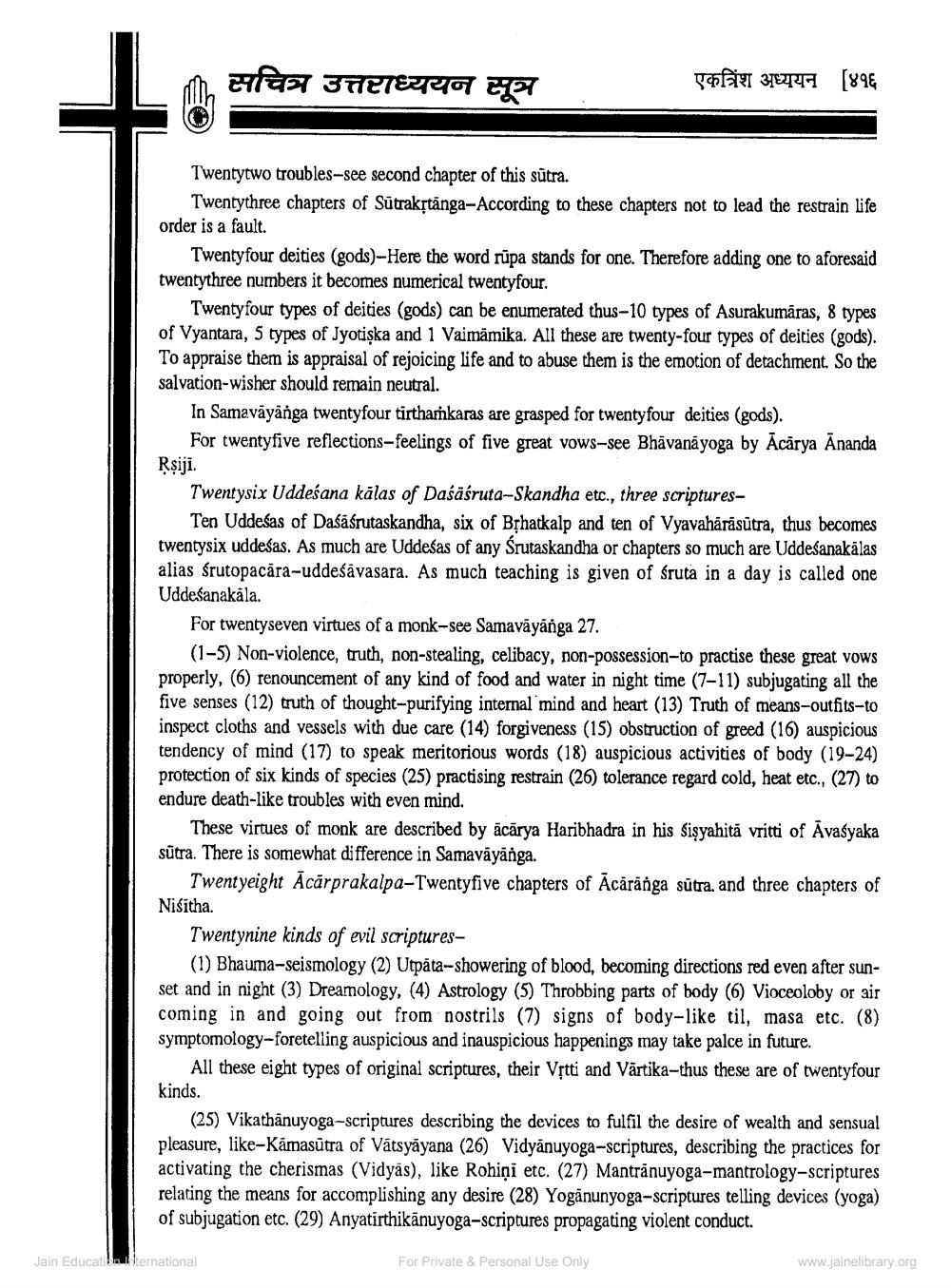________________
तर सचित्र उत्तराध्ययन सूत्र
एकत्रिंश अध्ययन [४१६
Twentytwo troubles-see second chapter of this sūtra.
Twentythree chapters of Sūtrakstānga-According to these chapters not to lead the restrain life order is a fault.
Twentyfour deities (gods)-Here the word rūpa stands for one. Therefore adding one to aforesaid twentythree numbers it becomes numerical twentyfour.
Twentyfour types of deities (gods) can be enumerated thus-10 types of Asurakumāras, 8 types of Vyantara, 5 types of Jyotişka and 1 Vaimămika. All these are twenty-four types of deities (gods). To appraise them is appraisal of rejoicing life and to abuse them is the emotion of detachment. So the salvation-wisher should remain neutral.
In Samavāyanga twentyfour tirtharkaras are grasped for twentyfour deities (gods).
For twentyfive reflections-feelings of five great vows-see Bhāvanāyoga by Ācārya Ananda Rşiji.
Twentysix Uddeśana kālas of Daśāśruta-Skandha etc., three scriptures
Ten Uddeśas of Daśāśrutaskandha, six of BỊhatkalp and ten of Vyavahārāsūtra, thus becomes twentysix uddesas. As much are Uddeśas of any Śrutaskandha or chapters so much are Uddeśanakalas alias śrutopacăra-uddeśavasara. As much teaching is given of śruta in a day is called one Uddeśanakala.
For twentyseven virtues of a monk-see Samaväyånga 27.
(1-5) Non-violence, truth, non-stealing, celibacy, non-possession-to practise these great vows properly, (6) renouncement of any kind of food and water in night time (7-11) subjugating all the five senses (12) truth of thought-purifying internal mind and heart (13) Truth of means-outfits-to inspect cloths and vessels with due care (14) forgiveness (15) obstruction of greed (16) auspicious tendency of mind (17) to speak meritorious words (18) auspicious activities of body (19-24) protection of six kinds of species (25) practising restrain (26) tolerance regard cold, heat etc., (27) to endure death-like troubles with even mind.
These virtues of monk are described by acārya Haribhadra in his fişyahită vritti of Avaśyaka sūtra. There is somewhat difference in Samavāyanga.
Twentyeight Ācārprakalpa-Twentyfive chapters of Ācāränga sutra, and three chapters of Nisitha.
Twentynine kinds of evil scriptures
(1) Bhauma-seismology (2) Utpåta-showering of blood, becoming directions red even after sunset and in night (3) Dreamology, (4) Astrology (5) Throbbing parts of body (6) Vioceoloby or air coming in and going out from nostrils (7) signs of body-like til, masa etc. (8) symptomology-foretelling auspicious and inauspicious happenings may take palce in future.
All these eight types of original scriptures, their Vịtti and Vārtika-thus these are of twentyfour kinds.
(25) Vikathānuyoga-scriptures describing the devices to fulfil the desire of wealth and sensual pleasure, like-Kamasutra of Vatsyāyana (26) Vidyānuyoga-scriptures, describing the practices for activating the cherismas (Vidyas), like Rohiņi etc. (27) Mantrānuyoga-mantrology-scriptures relating the means for accomplishing any desire (28) Yogānunyoga-scriptures telling devices (yoga) of subjugation etc. (29) Anyatirthikānuyoga-scriptures propagating violent conduct.
Jain Education lernational
For Private & Personal Use Only
www.jainelibrary.org




